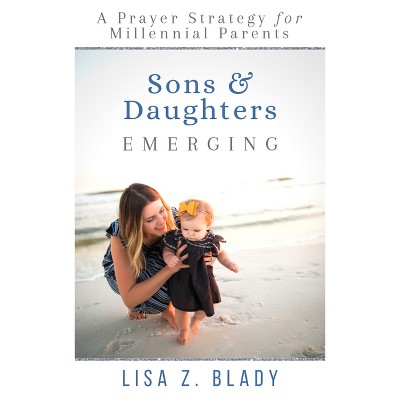Sponsored

Sons, Daughters, and Sidewalk Psychotics - by Neil Gong
$30.00
In Stock
Eligible for registries and wish lists
Sponsored
About this item
Highlights
- Sociologist Neil Gong explains why mental health treatment in Los Angeles rarely succeeds, for the rich, the poor, and everyone in between.
- About the Author: Neil Gong is assistant professor of sociology at the University of California, San Diego.
- 328 Pages
- Social Science, Disease & Health Issues
Description
About the Book
"In 2022, Los Angeles became the US city with the largest population of unhoused people, a stark contrast with the city's luxurious hillside mansions. This book from sociologist Neil Gong traces the divide between the haves and have nots by looking to mental health treatment, a key factor in what kind of life a person can live. As Gong shows, the mental health options available to the wealthy versus the poor affects not only the resources they can access, but their very personhood. The Downtown Skid Row area is infamous as "America's homeless capital"-a dumping ground for people with mental illness, ex-prisoners, and addicts. For people diagnosed with mental illness who get caught in the social safety net, often through arrests, the state will largely offer a slate of outpatient tactics. Caseworkers visit individuals regularly to help them with the necessities of functioning independently, such as obtaining identification and shopping for groceries. These services often keep mentally ill people housed, fed, and hopefully out of prison, but they rarely offer treatment for people in psychological distress. They are free but not treated. Across town in West LA or the beach cities, wealthy people diagnosed with serious mental illness attend luxurious treatment centers, from outpatient day clinics to residential programs by the ocean. Programs may offer yoga, holistic care, and farm-to-table organic meals alongside therapeutic treatments and university-affiliated psychiatrists. These treatments aim for psychological wellness, of course, but they also aim to stabilize people's lives, often through programs that greatly limit choice and mobility-families of the wealthy mentally ill expect that their loved ones will be contained. They are treated but not free. Throughout, Gong shows us starkly different ways of understanding people in psychic distress, and divergent ideas and pathways of recovery that may make them into separate kinds of people. At its core, this book project is about the way social context shapes problems and attempts to solve them. The book moves beyond psychiatric care to address issues of urban policy, family dynamics, and, ultimately, the meaning of freedom and personhood in contemporary America"--Book Synopsis
Sociologist Neil Gong explains why mental health treatment in Los Angeles rarely succeeds, for the rich, the poor, and everyone in between. Drawing on the nuanced experiences of patients and care providers, Sons, Daughters, and Sidewalk Psychotics introduces readers to two drastically different forms of community psychiatric services: public safety net clinics focused on keeping people housed and out of jail and elite private care trying to push clients toward respectable futures. In downtown Los Angeles, many people in psychiatric crisis only receive help after experiencing homelessness or arrest. Public providers engage in guerrilla social work to secure housing and safety, but these programs are rarely able to deliver true rehabilitation for psychological distress and addiction. Patients are free to refuse treatment or use illegal drugs--so long as they do so away from public view. Across town in West LA or Malibu, wealthy people diagnosed with serious mental illness attend luxurious treatment centers. Programs may offer yoga and organic meals alongside personalized therapeutic treatments, but patients can feel trapped, as their families pay exorbitantly to surveil and "fix" them. Meanwhile, middle-class families--stymied by private insurers, unable to afford elite providers, and yet not poor enough to qualify for social services--struggle to find care at all. Examining this divergent treatment of people facing similar mental struggles, Gong raises provocative questions about urban policy, individual freedom, and what it would take to create a fundamentally different psychiatric system--one that will meet the needs of patients, their loved ones, and society at large.Review Quotes
"As street homelessness grows, so does a corresponding mental health and drug crisis. . . . Gong's book provides a new, critical lens through which to think about how cities respond to homeless tent encampments, deploy the Housing First model, and approach drug decriminalization. His work offers clarity for raging debates about whether governments should bring back forced treatment and asylums for those opposed to voluntary care."-- "Vox"
"Sometimes it seems like academic researchers don't allow the people they are studying to get in the way of a predetermined political perspective. In Sons, Daughters, and Sidewalk Psychotics...the people being discussed actually bear resemblance to those I have personally known, loved, and sometimes feared and even hated...Gong's work depicts a homelessness that I have experienced in real life. One that is populated by people from different backgrounds, who hold a diversity of perspectives, and whose circumstances have the potential to inform new theoretical insights about cultures of care, resiliencies, and unmitigated marginalization."-- "Contexts"
"A Best Scholarly Book of 2024. Gong's book is full of haunting and beautiful scenes. . . In Sons, Daughters, and Sidewalk Psychotics, we learn how everyone is harmed by our approach to mental health, and how, for all their differences, both rich and poor sufferers of mental-health conditions are failed by the society they live in."-- "The Chronicle of Higher Eduation"
"Sons, Daughters and Sidewalk Psychotics is one of the most significant books on mental health in the past decade. Going forward, it will be a touchstone both for the field and for those theorizing social control generally. Gong has revealed our society's bifurcated approach to serious mental illness--one system for the rich that works to modify the soul, another for the poor that seeks merely to minimize public nuisances. . . . Gong obtains a rare balance between sophisticated theorizing and accessible prose. The book is simply a great read. It also provides much-needed updating of our understanding of social control and serious mental illness."-- "Social Forces"
"In Sons, Daughters and Sidewalk Psychotics, Neil Gong delivers a vivid and up-close ethnographic account of mental illness and homelessness in Los Angeles, California, an account that carefully unpacks individual outcomes at the intersection of personal recovery, mental health care, and social class. . . . It is the contrast between [two government projects] that reveals some of the profound paradoxes at the heart of contemporary policy responses to the homelessness crisis. In this regard, the book is comparative ethnography at its finest."-- "Journal of Urban Affairs"
"Sons, Daughters, and Sidewalk Psychotics points the way to a more honest debate about community mental health." -- "City Journal"
"An innovative study of mental health care for the poorest and the richest of the city's inhabitants--showing how the system fails all, albeit in different ways. . . . Few authors capture this dynamic as neatly as Gong does in Sons, Daughters, and Sidewalk Psychotics, his study of two strikingly dissimilar mental health treatment regimes in the same city."-- "The New Republic"
"Gong grapples with the system of mental healthcare that Los Angeles has adopted in the wake of the closure of asylums. . . . He maintains hope we can build a better future for some of the most vulnerable people in our society."-- "Planet Money"
"In this nuanced study, UC San Diego sociologist Gong compares and contrasts two mental health 'treatment approaches' in Los Angeles. . . . Gong persuasively recommends establishing a more structured outpatient system of public mental health care (while cautioning against a return to the asylum's prison-like potential for abuse). Mental health professionals and advocates will find much to learn."-- "Publishers Weekly"
"Sons, Daughters, and Sidewalk Psychotics is a heartbreaking book. Gong carefully details the way we have created a system in which the right to freedom has far outstripped the right to health care and housing--because that choice saves time and effort for the rest of us. The deep insight of the book is how differently these freedoms unfold for those with money and those without. This is a thoughtful and well-researched book that could help us to make better choices."-- "Tanya Luhrmann, author of "Of Two Minds""
"The United States is a world leader in psychiatric science but routinely fails its vulnerable people with severe mental illness. Gong's study provides critical information for understanding systemic challenges faced by patients, families, clinicians, and public authorities. The novel findings illuminate the half century of failure in community treatment and offer a rich and detailed study for those who aim to advance care and quality of life for the mentally ill."-- "William T. Carpenter, editor emeritus of "Schizophrenia Bulletin""
"This book is smart, heartbreaking, and ethnographically rich and glitters with surprising insights. It's much more than a book about mental illness: it's about how we define and nurture freedom, personhood, and human dignity--and how we deny them."-- "Colin Jerolmack, author of "Up to Heaven and Down to Hell""
"Sons, Daughters and Sidewalk Psychotics provides an up close, on-the-ground journey into the treatment options and experiences of two strikingly disparate socioeconomic populations: the mentally ill homeless on the streets of Los Angeles and their similarly impaired but economically advantaged counterparts who reside in the upper middle class and upper class neighborhoods of western LA. Given the concerns about homelessness and mental illness across the country, this is a most timely and insightful contribution to understanding of the intersection of these two pressing issues."-- "David A. Snow, author (with Leon Anderson) of "Down on Their Luck""
"Set in Los Angeles, epicenter of homelessness, Sons, Daughters, and Sidewalk Psychotics weaves an eloquent tale of the contradictions involved in mental health care for the wealthy versus the indigent. The comparison itself is innovative, as is the idea that freedom, something often prized without question, can mean neglect. It is an engaging read that poses innovative questions about how our understanding of mental health care reflects and perpetuates systems of inequality."-- "Michele Wakin, author of "Homelessness in America""
"Combining rich storytelling, sharp analysis, and brave scrutiny of unpopular ideas, Gong reveals America's mental health crisis to be as much about class inequality and cultural hypocrisy as it is about brain chemistry and medical diagnoses. Comparative sociology at its finest, from one of the most promising ethnographers working today."-- "Forrest Stuart, author of "Down, Out, and Under Arrest" and "Ballad of the Bullet""
About the Author
Neil Gong is assistant professor of sociology at the University of California, San Diego. He is coeditor, with Corey Abramson, of Beyond the Case: The Logics and Practices of Comparative Ethnography. His writing has appeared in the Washington Post, the Atlantic, and the Los Angeles Review of Books.Dimensions (Overall): 9.06 Inches (H) x 5.98 Inches (W) x 1.26 Inches (D)
Weight: 1.45 Pounds
Suggested Age: 22 Years and Up
Number of Pages: 328
Genre: Social Science
Sub-Genre: Disease & Health Issues
Publisher: University of Chicago Press
Format: Hardcover
Author: Neil Gong
Language: English
Street Date: March 29, 2024
TCIN: 1006100198
UPC: 9780226581903
Item Number (DPCI): 247-49-9598
Origin: Made in the USA or Imported
If the item details aren’t accurate or complete, we want to know about it.
Shipping details
Estimated ship dimensions: 1.26 inches length x 5.98 inches width x 9.06 inches height
Estimated ship weight: 1.45 pounds
We regret that this item cannot be shipped to PO Boxes.
This item cannot be shipped to the following locations: American Samoa (see also separate entry under AS), Guam (see also separate entry under GU), Northern Mariana Islands, Puerto Rico (see also separate entry under PR), United States Minor Outlying Islands, Virgin Islands, U.S., APO/FPO
Return details
This item can be returned to any Target store or Target.com.
This item must be returned within 90 days of the date it was purchased in store, shipped, delivered by a Shipt shopper, or made ready for pickup.
See the return policy for complete information.
Trending Non-Fiction

$15.68
Buy 2, get 1 free select books
4.8 out of 5 stars with 180 ratings

$19.31
was $20.98 New lower price
Buy 2, get 1 free select books
4.1 out of 5 stars with 53 ratings

$19.58
MSRP $29.00
Buy 2, get 1 free select books
4.7 out of 5 stars with 11 ratings

$4.59
MSRP $7.99
Buy 2, get 1 free select books
4.8 out of 5 stars with 116 ratings

$6.20
MSRP $10.95
Buy 2, get 1 free select books
4.8 out of 5 stars with 32 ratings

$7.09
MSRP $9.99
Buy 2, get 1 free select books
4.9 out of 5 stars with 45 ratings





